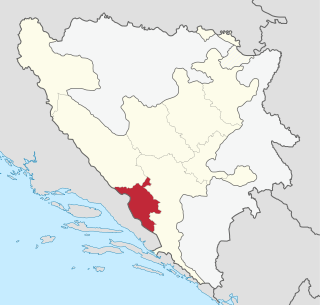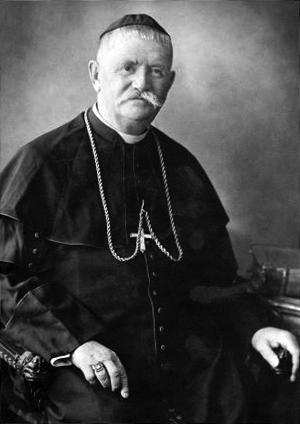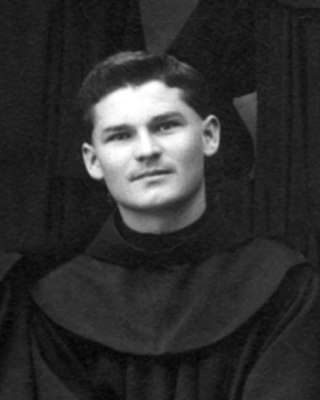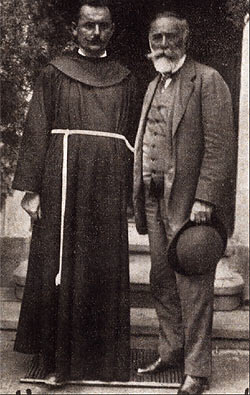
Široki Brijeg is a city and the regional capital of West Herzegovina Canton of the Federation of Bosnia and Herzegovina, an entity of Bosnia and Herzegovina. As of 2013, the town itself had a population of 6,149 and the municipality of 28,929.

The West Herzegovina Canton is one of the cantons of the Federation of Bosnia and Herzegovina. The West Herzegovina Canton is in the Herzegovina region in the southwest of Bosnia and Herzegovina. Its seat of government is in Široki Brijeg, while other municipalities within the Canton are Grude, Ljubuški and Posušje. It has 94,898 inhabitants, of whom more than 98% are ethnic Croats. Economically, it is the most developed part of Bosnia and Herzegovina.

Posušje is a town and municipality in Bosnia and Herzegovina. It is located in the West Herzegovina Canton, a federal unit of the Federation of Bosnia and Herzegovina.

The Catholic Church in Bosnia and Herzegovina is a part of the worldwide Catholic Church under the spiritual leadership of the pope in Rome.

Petar "Pero" Brzica was a Croatian Franciscan of the "Order of Friars Minor" who became a mass murderer during the Ustaše regime. He committed his atrocities at the Jasenovac concentration camp during World War II. He personally murdered up to 1,360 inmates at the camp.
Dominik Mandić was a Herzegovinian Croat Franciscan and historian.

Franciscan Province of Bosna Srebrena is a province of the Franciscan order of the Catholic Church in Bosnia and Herzegovina, historically active in Croatia as well. Their headquarters are currently in Sarajevo.

Alojzije Mišić was a Bosnian Croat Franciscan and prelate of the Catholic Church who served as the bishop of Mostar-Duvno and the apostolic administrator of Trebinje-Mrkan from 1912 until his death in 1942.
Paoča is a village in the municipality of Čitluk, Bosnia and Herzegovina.
The First League of Bosnia and Herzegovina operated by the Football Association of Bosnia and Herzegovina was the top tier football league in Republic of Bosnia and Herzegovina, and after signage of Dayton Peace Agreement of Bosnia and Herzegovina, until creation of Premier League of Bosnia and Herzegovina in 2000. League changed format and name several times since its inception and the first 1994–95 season.
Franciscan Province of Herzegovina of the Ascension of the Blessed Virgin Mary is a province of the Catholic religious order of the Order of Friars Minor, commonly known as Franciscans. It was established in 1843 when it seceded from the Franciscan Province of Bosna Srebrena. Its headquarters are in Mostar.

Franciscan friary of the Assumption of the Blessed Virgin Mary is a friary of the Franciscan Province of Herzegovina in Široki Brijeg. The friary church was built in 1905 and the friary in 1846. A much older and smaller church was built in 1847 and was demolished in 1905, in order to be replaced by a larger church. The friary is the first Franciscan friary built in Herzegovina after the Ottomans destroyed all of the monasteries there in the 16th century.

Paškal Buconjić was Herzegovinian Croat Franciscan and a prelate of the Catholic Church who served as the first bishop of Mostar-Duvno from 1881 to 1910, as the apostolic administrator of Trebinje-Mrkan from 1890 to 1910, as the apostolic vicar of Herzegovina from 1880 to 1881, and as custos of the Franciscan Custody of Herzegovina between 1874 and 1879.
Ivo Ištuk is a Bosnian professional football manager. He is regarded as one of the most successful Bosnian football managers.
Didak is a Slavic surname and given name. Notable people with the name include:

Anđeo Kraljević was a Herzegovinian Croat Franciscan and a prelate of the Catholic Church who served as Apostolic Vicar of Herzegovina in the Ottoman Empire from 1864 to 1879. Kraljević was also the first Custos of the Franciscan Custody of Herzegovina, holding the office on two occasions, from 1852 to 1856 and again from 1862 to 1865.

Leo Petrović was a Herzegovinian Croat Franciscan and historian.

Franciscan friary of Saint Anthony is a friary of the Franciscan Province of Herzegovina in Humac, Ljubuški in Bosnia and Herzegovina. The friary church was built in 1869 and the friary in 1871. During World War II, the friary was heavily damaged, but its south and east wing, as well as the church, were renovated in 1961, while the south wing was built anew in 1967.

Radoslav Glavaš was a Herzegovinian Franciscan who headed the Department of Religion of the Ministry of Justice and Religion of the fascist Independent State of Croatia during World War II.
Ilija Vidošević, also surnamed as Vidošević-Ćavar was a Herzegovinian Croat Franciscan who served as the custos of the Franciscan Custody of Herzegovina from 1856 to 1862. He was one of the main initiators of the construction of the Franciscan friary in Široki Brijeg and the establishment of the Apostolic Vicariate of Herzegovina, separate from the Bosnian vicariate.














